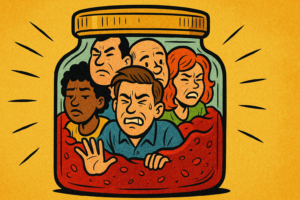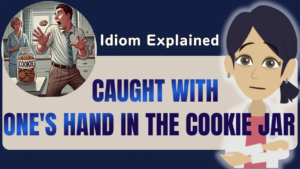Ever brought jam to a ‘jam-packed’ party and wondered why everyone laughed?
Extremely full, crowded, or filled to capacity with people, things, or activities.
Idioms like ‘jam-packed’ can be puzzling for English learners, yet they add color and personality to your speech.
In this post, you’ll master this common expression, learn its origins, discover similar phrases, and avoid embarrassing misinterpretations.

Enhance your English with this essential idiom!
Why Idioms Help Learners
Idioms are an essential part of English because they convey meanings that go beyond literal definitions.
These expressions add a layer of color and personality to speech, capturing nuances that straightforward descriptions often miss.
Whether you are describing a crowded music festival or a schedule filled to the brim with activities, idioms can help you paint a lively picture for your audience.



Understanding them also boosts your confidence when interacting with native speakers, enabling you to connect on a deeper cultural level.
Idioms, however, can be puzzling. When you take them word for word, you end up with funny—and often incorrect—interpretations.
The good news is that once you become familiar with common idioms like “jam-packed”, you can apply similar logic to other English phrases.
Core Meaning & Origins
“Jam-packed” generally means that a space, event, or schedule is crammed with people, things, or activities. If you picture a jar brimming with jam, you get the sense of an environment so filled that there seems to be no room left.
Though the exact origin of the term remains somewhat unclear, written evidence suggests it has been a part of everyday English since the early 20th century.
Over time, it evolved into a go-to idiom for describing situations or places bursting with energy—or people!
Misunderstandings & Funny Tale
Despite its widespread usage, “jam-packed” can create a humorous scenario when taken literally:
- Someone might mistakenly think a party described as “jam-packed” requires them to bring jam.
- A friend hearing about a “jam-packed” meeting room might visualize toast and fruit preserves instead of a tight seating arrangement.
One amusing anecdote involves a language learner who arrived at a “jam-packed” celebration with a jar of strawberry jam, convinced the host had requested it.
Though the event was crowded and lively, everyone had a good laugh about the misunderstanding. This story highlights just how easily idioms can lead to confusion if you rely on direct translations.
Everyday Practical Examples
How do you apply “jam-packed” to daily conversations? Here are some scenarios:
- Events and Festivals
- “The summer festival was jam-packed with live music, delicious food, and fun games.”
- “The summer festival was jam-packed with live music, delicious food, and fun games.”
- Public Transport
- “The train was jam-packed during the morning commute. I could hardly move!”
- “The train was jam-packed during the morning commute. I could hardly move!”
- Work Schedules
- “My calendar is jam-packed this week, so I might need to postpone our lunch.”
- “My calendar is jam-packed this week, so I might need to postpone our lunch.”
- Social Gatherings
- “Her birthday party was jam-packed with friends from every stage of her life.”
- “Her birthday party was jam-packed with friends from every stage of her life.”
- Shopping and Sales
- “The mall was jam-packed on the first day of the holiday sale. The lines felt endless.”
In each example, “jam-packed” vividly conveys the sense of being completely full. You are not just saying “busy”; you are describing something that is so crowded there is barely room to breathe.
Similar & Opposite
When you want more variety in your descriptions, you can turn to synonyms or contrasting phrases:
Synonyms for “Jam-Packed”
- Packed to the gills
Conjures an image of a fish with its gills tightly filled.- “The stadium was packed to the gills with cheering fans.”
- Full to bursting
Emphasizes the idea of being so full that something is about to pop.- “The suitcase was full to bursting with souvenirs from the trip.”
- Crammed to capacity
Suggests there is absolutely no extra space left.- “The meeting room was crammed to capacity, so I had to stand by the door.”
Opposite Expression
- Empty as a ghost town
Evokes a place devoid of people or activity, offering a stark contrast to “jam-packed.”- “The restaurant was empty as a ghost town on a weekday afternoon.”
By using these complementary expressions, you can create more varied and precise narratives in your English conversations.
Whether you are talking about an overcrowded event or a space with no one in sight, these phrases will help you communicate effectively.
Related Idioms
If you find “jam-packed” helpful, there are additional idioms that convey similar ideas of crowdedness or density:
- Bursting at the seams
Suggests a place or situation is so full it might tear.- “The concert hall was bursting at the seams with enthusiastic fans.”
- Wall to wall
Conveys the notion that every corner is occupied, often used for people or objects.- “The convention center felt wall to wall with excited attendees.”
- Shoulder to shoulder
Highlights physical closeness, often in crowds.- “We were standing shoulder to shoulder in the packed elevator.”
These idioms paint equally vivid pictures of a tight and bustling setting. Learning them helps you choose the best phrase for each specific context, refining your language abilities in the process.
Everyday Scenes to Remember
To make “jam-packed” more memorable, think about everyday situations in which crowds or congestion are typical. Visualizing these can help you recall the idiom spontaneously:
- Morning Commute
- Trains or buses during peak hours are often so crowded that passengers have no personal space.
- “The commute was jam-packed as usual, so I ended up standing for thirty minutes.”
- Busy Tourist Attractions
- Popular landmarks are often teeming with visitors.
- “The famous museum was jam-packed with tourists snapping photos.”
- Seasonal Sales
- Big promotional events like Black Friday or holiday sales attract massive crowds.
- “The store was jam-packed with shoppers hunting for discounts.”
- Popular Restaurants
- A trendy place often has more patrons than available tables.
- “We went on a Saturday night, and the place was jam-packed. We had to wait an hour for a seat.”
By associating the idiom with everyday experiences, it will gradually become second nature to use it in conversation.
Personal Story: Feel the Energy
Some might view crowds as stressful, while others find them thrilling. Think about a time when you were in a bustling environment, whether it was a rock concert or a local festival.
Did the buzz of excitement outweigh the discomfort of limited personal space? Often, being jam-packed among others can create a sense of camaraderie and shared excitement.
For instance, I once attended a live music event where every inch of the venue was filled. Though it was hard to find a comfortable spot, the collective enthusiasm of the audience was electrifying.
This personal encounter encapsulated what it truly means for an event to be jam-packed: the crowd was not just large; it was pulsating with life and energy.
Rephrase & Practice
To ensure the phrase remains clear and adaptable, consider these alternatives for rephrasing “jam-packed” without losing its essence:
- Crowded
- “The lobby was so crowded that we waited outside.”
- Full
- “The restaurant was full, so we tried another place.”
- Brimming with people
- “The conference hall was brimming with people, each eager to hear the keynote speaker.”
Each alternative conveys a sense of density. By practicing synonyms, you reinforce your understanding of “jam-packed” and gain flexible language skills for different conversational settings.
You can also insert a quick mental image of a jar filled to the brim whenever you need a memory aid.
Pop Quiz: Check Your Idiom Skills
Jam-Packed

Bringing It All Together
By now, you have explored the meaning of “jam-packed”, discovered its likely origins, learned about humorous pitfalls when it is taken literally, and compared it to closely related idioms.



Incorporating “jam-packed” into your vocabulary can make you sound more natural and expressive in English.
Whether you are describing a bustling event, a claustrophobic commute, or a jammed itinerary, this phrase brings clarity and a dash of personality to your descriptions.
Key Takeaways:
- “Jam-packed” signifies something that is extremely full or crowded.
- Use it to add vivid detail to real-life scenarios, from holiday sales to exciting social gatherings.
- Memorize related idioms like “packed to the gills,” “full to bursting,” and “shoulder to shoulder” for variety.
- If you need the opposite notion, try describing something as “empty as a ghost town.”
- Practice using “jam-packed” with personal examples or familiar situations so it becomes second nature.
Mastering this idiom, along with its synonyms and antonyms, will empower you to communicate more effectively.
As you continue to learn English, sprinkling idioms like “jam-packed” into your everyday speech can captivate listeners and keep your conversations lively.
Try it out the next time you talk about a bustling environment or a packed schedule, and see how vividly it expresses your meaning!









Comment